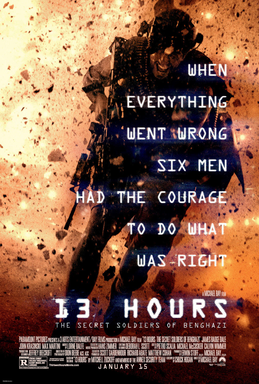(Lisa recently discovered that she only has about 8 hours of space left on her DVR! It turns out that she’s been recording movies from July and she just hasn’t gotten around to watching and reviewing them yet. So, once again, Lisa is cleaning out her DVR! She is going to try to watch and review 52 movies by Wednesday, November 30th! Will she make it? Keep checking the site to find out!)
I recorded 13 Hours off of Epix on October 14th.
Before I say anything else about 13 Hours, I would like to be point out something that I haven’t seen mentioned in any of the other reviews of this film. 13 Hours is not just a recreation of the September 11th, 2012 attack on the American diplomatic compound in Benghazi, Libya. (This attack led to death of Ambassador Chris Stevens, Tyone Woods, Sean Smith, and Glenn Doherty, all of whom are portrayed in the film.) 13 Hours is also a very unexpected The Office reunion. On The Office, John Krasinski played Jim Halpert while David Denman played Roy Anderson, the ex-fiance of Jim’s wife, Pam. In 13 Hours, they both play members of the American security detail who spend 13 terrifying hours trying to protect the compound from a violent and heavily armed mob.
They’re both surprisingly well-cast. As someone who absolutely loved The Office, I had my doubts as to whether or not I’d be able to believe John Krasinski — he of the iconic smirk and the adorable eye roll — as a battle-hardened, former Navy SEAL. Jim Halpert with a gun!? I wondered. But Krasinski brings an unexpected gravity to his role, as does David Denman. For that matter, the entire cast — and this is truly an ensemble film, even if it is dominated by Krasinski and James Badge Dale (in the role of Tyrone Woods) — does surprisingly well. If I sound surprised, that’s because 13 Hours was directed by Michael Bay, a director who is not exactly known for his skill with actors.
It says something about how messed up 2016 has been that, for a few weeks in January, 13 Hours was the most controversial film in America. When the film was first released, many commentators and critics were convinced that it was all part of a grand conspiracy to keep Hillary Clinton from being elected President. Now, 11 months later, we can look back and — well, hmmm. Hillary Clinton wasn’t elected President but that probably has nothing to do with 13 Hours. If I remember correctly, 13 Hours didn’t exactly set the box office on fire. It was pretty much forgotten by February. Unless 13 Hours somehow convinced Hillary Clinton to not campaign in Wisconsin or Michigan, I imagine that it had little influence on the actual election.
Neither Hillary Clinton nor, for that matter, Barack Obama are ever mentioned in 13 Hours. (Then again, the film also never tries to convince us that the attack was solely the result of a YouTube video, either.) That’s not to say that there isn’t a political subtext to 13 Hours. (It’s impossible to make a movie about Americans with guns in the Middle East without there being some sort of political subtext.) However, that subtext has less to do with what happened during the attack and more about whether or not the U.S. should have even gotten involved in the Libyan Civil War in the first place. If anything, 13 Hours seems to be suggesting that any sort of American military intervention in the Middle East is doomed to failure.
Make no mistake about it. Thematically, 13 Hours is Michael Bay’s darkest film. It starts with disturbing footage of the Libyan revolution and it ends with shots that linger over the ruins of the compound that several men were either killed or wounded attempting to defend. Even those who manage to survive the 13-hour battle are left scarred, both physically and emotionally. For perhaps the first time in a Bay film, no attempt is made to make war look heroic or inviting. There’s none of the over the top sentimentality that typifies so many of Bay’s other films. Instead, there’s just John Krasinski sobbing as he realizes that his friends are dead.
That said, Bay has to be Bay. In some ways, 13 Hours is his most mature film to date but that doesn’t mean that it doesn’t showcase a lot of Bay’s flaws as a filmmaker. At 2 and a half hours, the film is at least 50 minutes too long and the scenes of Krasinski talking to his pregnant wife feel like they were lifted from an unpolished second draft of American Sniper and, as a result, they’re never as powerful as they were obviously meant to be. As usual, Bay does better with the action sequences than with the human element.
In the end, 13 Hours is a frequently harrowing, if rather uneven, film. If nothing else, it may be remembered for heralding the unlikely emergence of John Krasinski, action star.


